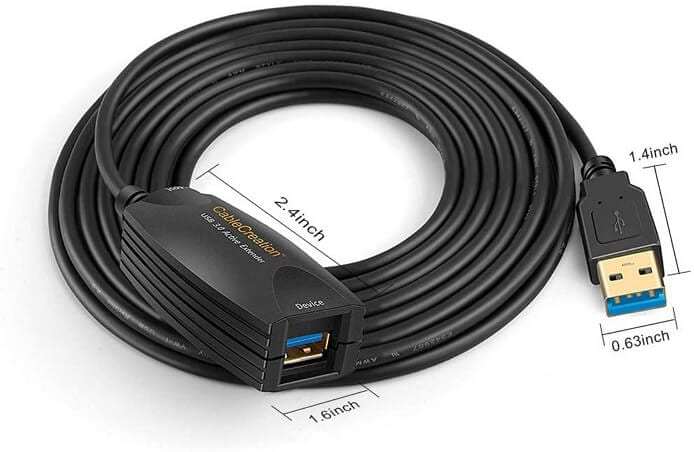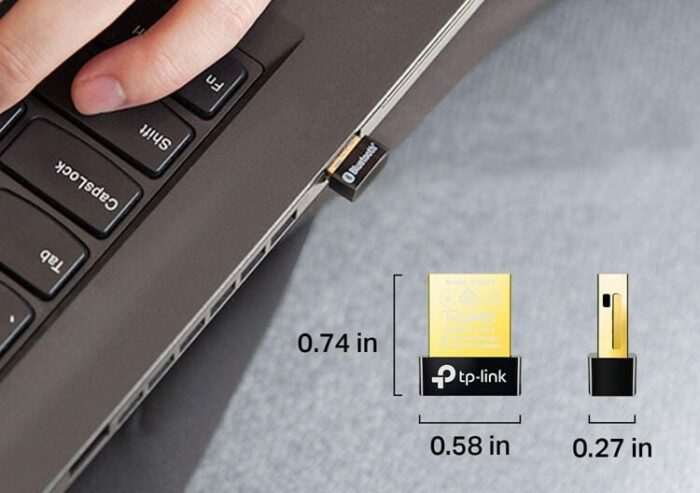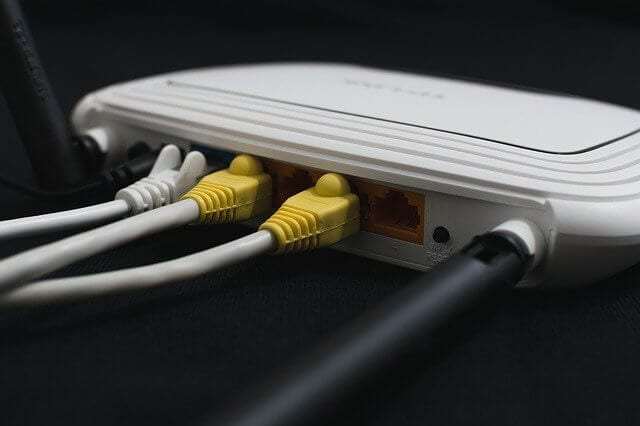- How to Stop Bluetooth from Interfering With WiFi
- What is Bluetooth Interference?
- How to Identify Bluetooth Interference?
- Static Noise
- Delays
- Connection Drops
- How to Stop Bluetooth from Interfering with WiFi?
- Remove Barriers
- Change Your Router Channel
- Change Your Router/Device Location
- Move Away from Microwaves and Fluorescent Lights
- Other Reasons Why Your Bluetooth Device Keeps Disconnecting
- Establishing a Stable Bluetooth Connection
- Conclusion
- 5 Methods to Fix WiFi-Bluetooth Interference on Your PC
- #1 Disconnect and connect your WiFi again
- #2 Try to run network troubleshoot
- #3 Move the WiFi from Bluetooth away
- #4 For a laptop, switch to external Bluetooth
- #5 If your router support 5 GHz, use it!
- About The Author
- Christian
How to Stop Bluetooth from Interfering With WiFi
Are you facing interference issues between your Bluetooth and your WiFi?
Interference issues don’t occur often, but they can cause quite a lot of frustration when they do.
Given how much we interact with our electronic gadgets and WiFi connection, such interferences can get in the way of your daily tasks. Therefore, it’s best to deal with them as soon as possible.
What causes these interference issues? And how to stop Bluetooth from interfering with WiFi?
We suggest you keep reading. In this post, not only do we discuss the cause of these interference issues, but we also discuss some potential solutions.
What is Bluetooth Interference?
You’re freed from the tangled mess of wired devices, thanks to Bluetooth devices. Bluetooth uses radio frequencies to establish a wireless connection with other devices. Usually, Bluetooth devices send signals over a 2.4 GHz frequency.
Generally, these frequencies don’t interfere with each other. However, if another device sends signals over the same frequency as your Bluetooth, you may face some interference issues.
Here are a few devices that we noticed may cause interference with your Bluetooth signals:
- WiFi
- Microwaves
- Wireless speakers
- Baby monitors
- Satellite dishes
- Phones that have 2.4 or 5 GHz processors
If you’ve purchased high-quality products, you don’t have to worry about these interferences as usually Bluetooth signals are weaker than other devices.
Moreover, Bluetooth uses spread-spectrum frequency hopping, which means that they rotate between seventy randomly chosen frequencies. This technology prevents two devices from sharing the same frequency.
Even if they somehow end up sharing the frequency, as the spread-spectrum technology changes the frequency 1600 times a second, the interference won’t last long.
How to Identify Bluetooth Interference?
So, how can one tell if they’re experiencing interference in their Bluetooth connection?
Well, here are a few tell-tale signs to look out for:
Static Noise
One of the most common signs of interference is static noises. If another device also uses 2.4 GHz of frequency, you may hear a lot of static noise. This is noticeable if you’re using Bluetooth earphones or headsets.
Not only are these static noises annoying, but they can also be harmful to your ear if they’re constantly present.
Delays
If you’re using Bluetooth headphones or speakers, you may experience sound delays without any interference.
Bluetooth devices function differently from your usual wired devices. Audio waves are compressed and made to travel from the source to your device through frequencies. If another signal is traveling through the same frequency, you’re likely to experience delays.
Think of it this way: if you’re traveling on a one-way, single-lane road and another car is moving in front of you, you can’t speed ahead of the car. Unless the car moves, you can’t move. Your Bluetooth signal works the same way.
Connection Drops
Interference can cause your Bluetooth device to disconnect from your paired device. For example, if your Bluetooth mouse keeps disconnecting with your laptop, then you’re probably experiencing Bluetooth interference.
We suggest you keep trying to reconnect. However, if it still disconnects even after multiple attempts, you may want to take a closer look at the next section.
How to Stop Bluetooth from Interfering with WiFi?
So, what happens if you experience one of those rare instances where your Bluetooth interferes with your other devices?
There are a few ways through which you can prevent these interferences from happening.
Remove Barriers
The first solution is to get rid of any possible barriers. For example, sometimes, certain materials can prevent weaker signals like Bluetooth from passing through. Some possible materials that can interfere with your Bluetooth signals are:
- Metal
- Bulletproof glass
- Concrete
- Plaster
- Marble
- Bricks
If you notice your Bluetooth signal getting weaker and you have one of the materials mentioned above near you, we suggest taking a few steps away from the material.
Change Your Router Channel
Is your WiFi router interfering with your Bluetooth signals?
You may need to change the channel of your router.
If you use the Apple router, then your work becomes a lot easier. Simply rebooting your router might help solve this problem. When you reboot, your Apple router will automatically try to look for a new channel different from your Bluetooth channel to connect with.
However, if you don’t have an Apple router, you may manually change the channel. You can do this by going into the router settings. Experiment with the different media to see which setting is most suitable.
Change Your Router/Device Location
If you’re using a wireless headset, and you hear static, then chances are you’re experiencing interference. We suggest moving a little closer to your router or bringing the router closer to you.
This way, your WiFi signals become stronger, preventing the Bluetooth signals from interfering. So, for example, if you’re using Bluetooth headsets while on WiFi call, you’ll notice the interference going away once you move closer to your router.
Move Away from Microwaves and Fluorescent Lights
This may seem a bit ridiculous, and you may wonder what microwaves or fluorescent lights have to do with your Bluetooth connection.
Well, both microwaves and fluorescent lights emit frequencies of 2.4 GHz, which is the same frequency as your Bluetooth. Therefore, it might help clear your signals when you move away from the two.
Other Reasons Why Your Bluetooth Device Keeps Disconnecting
There’s a possibility that Bluetooth interference is not the reason why your paired devices keep disconnecting. Most Bluetooth devices, such as headphones, keyboards, mouse, run on batteries.
If your device battery is weak, it may be unable to maintain the established connection. So, if your Bluetooth headphones keep disconnecting or the sound is a bit delayed, maybe you should check the battery first.
Establishing a Stable Bluetooth Connection
After you’re done troubleshooting, it’s time to reconnect your Bluetooth to your device. The process is usually the same but may vary a little depending on what device you use.
Here’s a simple guide for you to follow when setting up your Bluetooth device to a Windows laptop:
- First, make sure your Bluetooth device is powered on.
- Next, type Settings in the search bar on the bottom left of your screen.
- Once the Settings window opens, go to Devices.
- The first tab is usually Bluetooth & other devices. Toggle on the switch under Bluetooth.
- Your laptop will automatically search for all available Bluetooth devices. When you see the name of your device, click on it to connect.
Once you establish a connection, your device will remember the Bluetooth device. So the next time you try to connect with it, your Bluetooth device name will show up in your devices, making it even easier to pair the two devices.
Conclusion
The days of tangled and torn wires are behind us thanks to Bluetooth technology that allows us to establish wireless connections between two devices.
However, Bluetooth technology isn’t as flawless as one would assume. Bluetooth interference is one such annoying yet the rare issue that occurs with Bluetooth devices.
This usually happens when another device uses the same frequency as your device. The issue is easy to solve. In this post, we’ve discussed various ways through which you can prevent interference.
Hedayat S
Hedayat is the new Editor-in-Chief of Rottenwifi and has been writing about computer networking since 2012. Hedayat’s strong background in computer science helped him cement his position in the ever-expanding tech blogging world. As a network engineer, systems administrator, and systems analyst during his decade-long career in Information Technology, he has a passion for the internet & technology in his DNA.
Blog.rottenwifi.com is a participant in the Amazon Services LLC Associates Program which means we may get paid commissions on editorially chosen products purchased through our links to retailer sites. All names, logos, brands, and images are trademarks or copyrighted materials of their respective owners. Amazon and the Amazon logo are trademarks of Amazon.com, Inc., or its affiliates.
5 Methods to Fix WiFi-Bluetooth Interference on Your PC
Have you ever experienced the WiFi connection suddenly slowed down when a Bluetooth device enabled? Well, apparently this problem is very common in the age of the internet.
The reason why this happens is that your WiFi and Bluetooth devices are using the same 2,4 GHz frequency. Meaning that the signal could interfere with each other while being used. Luckily, there some fixes you could try to avoid that issue in the future.
DISCLAIMER: I’m not an engineer myself but some of these advices below are based on my personal experience while others are gathered from many sources. After all, you have to try them to see which one is work.
#1 Disconnect and connect your WiFi again
This is silly, but it works. When you disconnect and connect the WiFi again, it will automatically search for the most optimal channel — usually, the one that is not being interfered with Bluetooth.
However, this is not a permanent solution. You might see the same problem again, especially after restarting the computer. So, don’t stick with it for a long period of time.
#2 Try to run network troubleshoot
The easiest way you can do to fix Bluetooth and WiFi interference is by running Windows Troubleshooters. Just right-click on the WiFi icon, select Troubleshoot problems, and wait for the instructions based on the detected problems.
I have found that this method is perfect when your WiFi suddenly drops after having a Bluetooth device connected to my computer.
#3 Move the WiFi from Bluetooth away
This method only works if you are using an external USB WiFi device. Try to use a male to female USB cable to move the WiFi receiver away from the Bluetooth device. Ideally, put it closer to the router so you could get a better connection.
The type of cable I would recommend is an active USB cable from CableCreation that can avoid data loss and minimize electrical interference. This kind of cable is also has a higher lifetime than a conventional USB cable.
#4 For a laptop, switch to external Bluetooth
He stated that the WiFi and Bluetooth on a laptop are using the same antenna. Hence, when you are using them at the same time, it may cause network trouble. It best to keep both devices not using the same feature on your laptop (credit to George Zlatev for this solution).
A typical cost of a small external USB Bluetooth (dongle) ranging from $10 to $20. There’s an even cheaper option like USB Bluetooth Dongle from ZEXMTE which costs around $8 and receives tons of positive reviews.
#5 If your router support 5 GHz, use it!
Since WiFi and Bluetooth are using the same 2 GHz frequency by default, why not change the router frequency to 5 GHz? While the idea is simple, unfortunately, there are not many routers capable of running on that frequency. Not to mention that many components like wireless printer or projector may not support 5 GHz WiFi.
However, if your router supports 5 GHz, you can enable that frequency to fix this issue. Try to ask your internet provider regarding the settings. I cannot provide the details since every router has a different configuration.
Alright, I hope at least one out of five methods above helps you. Thank you for visiting!
About The Author
Christian
A web developer and digital marketer who likes learning new stuff and sharing it with others along the way. Constantly striving for simplicity and accuracy and thus, AsapGuide was born.





